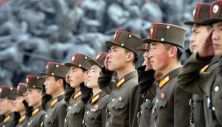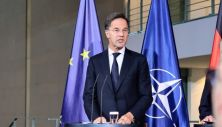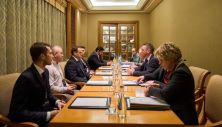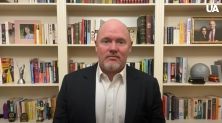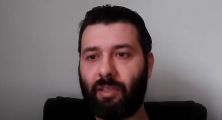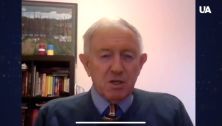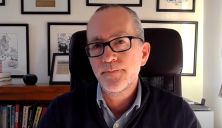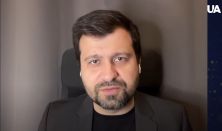In 2022, the Ukrainian public organization “Center for Civil Liberties”, the Russian human rights society “Memorial” and the founder of the Belarusian human rights center “Viasna” Ales Bialiatsky became the winners of the Nobel Peace Prize.
At the awards ceremony, the head of the Ukrainian organization, Oleksandra Matviychuk, said that she viewed the award of the Peace Prize “as recognition of the efforts of the Ukrainian people who courageously resisted attempts to destroy the peaceful development of Europe, and also as a celebration of the importance of the work done by human rights defenders to prevent the threat of war to the whole world.”
What opportunities did the Nobel Peace Prize open up for Ukraine? How to form a new system of values in Ukraine? How to improve the international system of law? Why shouldn’t a tribunal for Putin be like the Nuremberg Trials? Is it possible to divide Russians into “good” and “bad”? Is Ukraine now protected from propaganda? Is reconciliation between Ukrainians and Russians possible after the end of the war? Human rights activist Oleksandra Matviychuk spoke about this in an exclusive interview with the FREEDOM TV channel.
So, you received the Nobel Peace Prize, stood on the stage, which was broadcast to the whole world. And we understand that this moment has opened a window of opportunity for your organization and for you. What has this award and worldwide recognition already helped you do? And how long does it take to get the most out of a given premium?
The Nobel Peace Prize is a unique opportunity for us to be heard and express the voice of Ukrainian human rights activists. For years, we have been documenting war crimes in this war, which Russia started not in February 2022, but in February 2014. All these years we have been looking for justice, because without justice there will be no sustainable peace in our region. And now we have the opportunity to enter the international arena and declare it to a wide audience.
During our conversation, if you do not mind, I will quote your quotes from other interviews. In your speech from the stage in Oslo, you said that we need to create an international system in which all people feel safe and with guaranteed protection of human rights – regardless of whether they live in countries belonging to any or a military bloc. How do you see the evolution of the judiciary, say, from the period of Hitler to Putin, or, for example, from Milosevic to any other modern dictator, such as Lukashenka? Is there an effective system for punishing such criminals here and now, in our lifetime?
Unfortunately, the answer is obvious. Because the entire international security system could not stop the atrocities of Russia. And on the very day that the UN Secretary General [Antonio Guterres] came to Kyiv to meet with President Zelensky, Russian missiles hit a residential building and killed our colleague, journalist Vera Girich.
This is a verdict of the inefficiency of the entire international system of peace and security. It lies in ruins, like the Ukrainian Mariupol.
And we need to make a difference. If we talk about justice, there are still problems. And the problem, first of all, is in our thinking. Because when we talk about the Nuremberg trials, it was an important step towards establishing law and justice. But this was an example where Nazi war criminals were convicted only after the fall of the Nazi regime.
However, we live in a new century. Justice must be independent of the extent of the power of the Putin regime. We cannot wait. It is now that we must create an international tribunal and bring Putin, Lukashenko and other war criminals to justice.
In your speech, you spoke, in particular, about today’s victims in Ukraine. You said that as a person who works directly with victims, your question is very simple – who will give a chance for justice to hundreds of thousands of people who have suffered and whose cases the International Criminal Court will not take for consideration? Has the situation changed over this period of time, or do you see that it can become false hopes, which, if so, will prove to be very painful and destructive?
The situation is changing, but very slowly. When we started this human rights campaign in May of this year, justice never became a priority. The political leadership of many countries, first of all, talked about how to achieve peace.
We tried to explain that for decades Russia has been using war – war crimes and similar methods – as a tool to achieve geopolitical interests.
Russia has never been punished for all the atrocities committed in Chechnya, Moldova, Georgia, Mali, Syria, Libya and other countries of the world. They think they can do whatever they want. This cruelty has become part of Russian culture.
Therefore, if we want to achieve sustainable peace, we must demonstrate justice. Because this is not a war between two states. This is a war between two systems – authoritarianism and democracy.
You also said that a special tribunal for Putin – in contrast to the Nuremberg Trials delayed in time and dragged out for years – should take place here and now. I always ask this question to various analysts and politicians, and I want to ask you – when we create a tribunal for Putin, how can we physically pull Putin out of Russia and bring him to justice?
The options may be different, but the history of mankind convincingly proves that authoritarian regimes fall, and their leaders, who consider themselves untouchable, are brought to justice.
In our society, they are trying to divide Russians into “good” and “bad”. There are people who left Russia and started supporting Ukraine. And there are those who remained inside the country, where they either have no rights, or no influence, or no desire to do this… Do you support this division into “good” and “bad” Russians? And how does your organization treat Russians as a whole as a nation?
I don’t like that there is a distinction between “good” and “bad” Russians, because I judge people by their actions, based on their values.
And, unfortunately, I have to admit that the majority of Russians supported this war. Most Russians have this imperialist culture: they want to restore, even if by force, the Russian Empire.
That is why Putin rules Russia not only through repression and censorship, but also through a special social contract based on so-called Russian glory.
Only the success of Ukraine will cause Russians as a people to reflect on their imperialist culture and declare that such behavior is not normal in the 21st century.
And yes, there are other voices that are marginal at the moment. For example, the voices of our Russian colleagues in the defense of human rights. They are trying to oppose not only the Putin regime, but also the majority of public opinion in Russia.
Is it possible to change public opinion in Russia?
Not at the moment. Only the success of Ukraine paves the way for this transformation.
And without Putin, there will be an opportunity to change the opinion of the Russians?
“I think Putin is a big “ear” here, as our fellow Russian scientists say. This means that people after Putin will also have to fulfill the request of society.
Therefore, we need to work with the culture, which is the culture of the empire.
Your highest goal is to change international institutions such as the UN. But one of the problems that worries Ukrainians is the Russian Federation, even after being recognized as a sponsor of terrorism by the European Union, is still part of the UN… How to expel Russia from the UN, and then reform all such organizations down to the national levels? What tools can you use after receiving the Nobel Prize to make the world change the rules?
The problem is not the fact that Russia is a member of the UN. The problem is that Russia is a member of the UN Security Council. And the entire instrument on which the UN is based failed to stop Russia, the Russian war and Russian atrocities.
And I think in this situation, when we could not rely on the law and the international security system, we can always rely on people in different countries, because it is people who need security, it is people who need peace.
And it is people who need guarantees of human rights and respect for human dignity. Therefore, we must be able to organize the demand for these values, like serious demands on politicians in different countries to change this system, which no longer works.In one of the interviews, you said that you saw in Europe that people want peace, not justice. What did you mean?
I mean that they are considering the situation from some abstract position – supposedly peace can be achieved if the parties stop hostilities and lay down their arms. But in our situation, we are talking about the fact that part of the Ukrainian territories is under occupation, and the Russians are committing terror here – they are killing, torturing, imprisoning people who are not armed.
So it’s not about the world, because the world is a total state when you can live without fear and look to the future. Thus, we will not achieve peace if the invaded country stops fighting for liberation.


